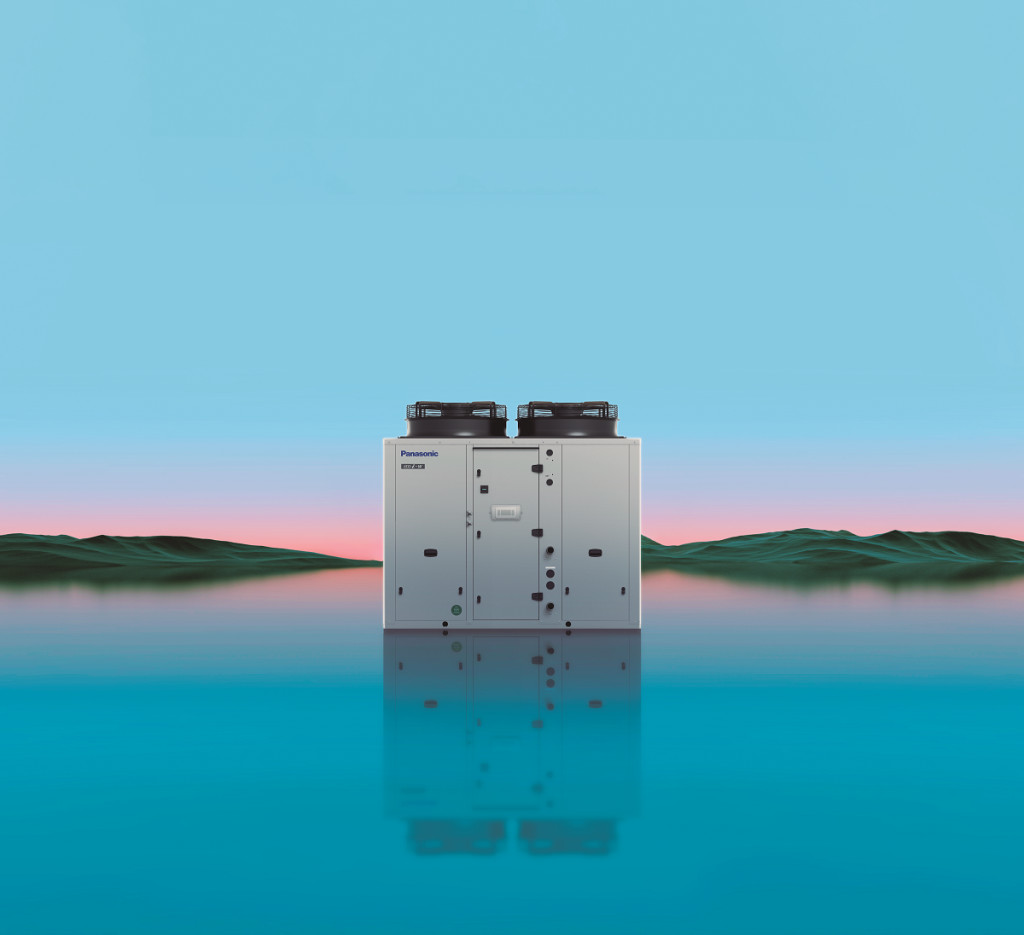Pump your way to energy efficient heating

With the building sector striving to meet Net Zero targets, there is a strong demand for sustainable energy solutions to replace existing heating systems for light commercial, industrial and large residential buildings. Paul Taylor – UK Head of Renewable Heating for Panasonic Heating & Cooling Solutions, explains how a water based heat pump system can provide a lower carbon, energy efficient solution for various applications.
The latest advances in heat pump technology are proving more energy efficient than other heating forms, such as gas or oil boilers. In some cases, heat pump units are proving three times more energy efficient than condensing gas boilers plus considerably lowering a building’s carbon footprint. This is particularly so
in projects where the systems are paired with intelligent controls delivering benefits in applications such as schools, offices, leisure centres, and industrial and large residential buildings.
The advantages of deploying air source heat pumps in such properties are clear: they can be more energy efficient than the existing systems, utilise low carbon technology, are easy to operate and are designed for installation in a variety of settings. With today’s advances, some systems can operate at higher temperatures, such as the Panasonic ECOi-W R290 range, which can be connected to existing heating/hot water infrastructure, which helps minimise disruption during installation. Heat pump manufacturers are ensuring the continual development of flexible solutions that meet the unique demands of such buildings and provide plenty of support and training for all elements of the specification, installation and commissioning process.
A renewable answer
To meet the rising demand to replace gas boilers in a wide range of building types, manufacturers have increased their portfolio of energy efficient alternative technologies that meet the challenges across the diverse building sector. Air-to-water reversible heat pumps are ideal for many light commercial applications such as schools, colleges, leisure centres, residential multi- occupancy and industrial buildings.
Typical technical challenges for such buildings include the need for long pipe runs with associated increased distribution losses, meaning higher temperatures will be needed to maintain sufficient performance and costly internal infrastructure could be required. Other issues include the need to serve shared spaces, the vertical distribution of office spaces or apartments, the need for more outside space per property, complex layouts, and so on. However, the latest technologies can match the outputs of traditional gas boilers and address the above issues.
For example, by providing 70°C output water from just 0°C outside air temperature, an air-to-water reversible heat pump solution delivers the output required to meet the challenges present in a wide range of applications.
Providing a higher achievable output temperature becomes a significant tool in overcoming the technical and logistical challenges of retrofitting buildings. With the 70°C output, there is less need to upgrade the internal infrastructure, as it may be able to connect to the existing pipework and radiators.
As heatwaves become more common, schools, office spaces, and residential multi-occupancy properties are left particularly vulnerable to this extreme weather. With heating and cooling operational through one system, these spaces can more easily achieve comfortable year-round climate control using fan coils.
Cascade control for greater efficiency
For commercial properties, efficiency is the key to creating a more sustainable building and reducing heating costs. Cascade control is increasingly utilised, using parallel-connected heat pumps and switching on the most efficient number as demand increases or decreases. In addition, the controller includes an intuitive touchscreen display with information about each connected heat pump – ideal for quick servicing and remote maintenance tasks to help save time and costs.
Empowering every property with sustainable heat
With suitable technology being introduced to the market, the important next step to make the change happen is a collaboration between manufacturers, property developers, suppliers, and specifiers to ensure adequate knowledge is provided to end users. An important consideration for commercial buildings is the administrative hurdles; for example, property ownership can be diverse. With properties being leasehold, owned by housing associations, or various business owners within an office space, the challenge becomes heightened to gain buy-in from a large audience. Therefore, manufacturers must continue to provide the most up-to-date information on the alternative technologies on the market and their capabilities to ensure effective decision-making is possible when retrofitting these light commercial-type buildings.
Preparing engineers for a changing environment
With the advent of new and rapid integration of alternative heating solutions, the role of engineers has assumed heightened significance and education, training and upskilling are vital. Although these alternative solutions offer a more sustainable solution, they do necessitate cautious handling, installation, and maintenance to ensure the safety of both engineers and end users. Transitioning to new and environmentally friendly alternatives demands specialised expertise and continuous training for engineers.
Professionals in the heating and cooling sector must remain attuned to shifting technologies, safety protocols, and emerging best practices. Ongoing professional development initiatives and training sessions enhance qualifications and competencies. Recognising this imperative, Panasonic places great importance on supporting engineers in their pursuit of knowledge, offering comprehensive online and hands- on accredited training. Plus, it has increased the number of training centres across the UK to empower them with the skills required to handle this transition.







